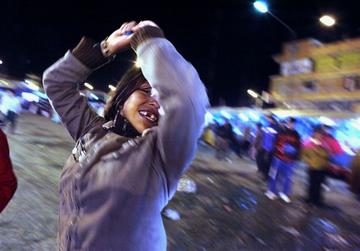Irish Examiner – 15 February 2010
Charities struggle to provide services to Bolivia's destitute street children — but with funding drying up those services are under threat, writes Caroline O'Doherty
 BOLIVIA'S secret children are eager to tell their names, which are often inspired by saints, scholars and kings.Society calls them by other names: runaway, outlaw, prostitute, pimp, thief, thug, junkie.
BOLIVIA'S secret children are eager to tell their names, which are often inspired by saints, scholars and kings.Society calls them by other names: runaway, outlaw, prostitute, pimp, thief, thug, junkie.
That's when society recognises them at all. For thousands of indigenous young Bolivians, their existence is an embarrassment and their plight a dilemma too difficult to resolve.
Their country is the poorest in South America, a region which offers plenty of competition for that unenviable position.
Centuries of exploitation by colonising powers left deep divisions, with wealth and authority typically in the hands of the settlers while oppression and poverty scourged the native Indian tribes.
Things are beginning to change but painfully slowly. The country's first indigenous Indian president, Evo Morales, has radical reform policies but with scant resources and an opposition frustrating his every move, the shadows of the past hang heavily over his efforts. It is among those shadows that the street children of Bolivia dwell. Relentless poverty has fractured many families and there are few social services to form a safety net for the children who fall through the cracks.
They head for the cities, sleep rough, steal, shine shoes or prostitute themselves for money, sniffing solvents to briefly forget their misery, using the night as cover for their activities and the shadows to escape the often brutal police. Their world is documented in a photo exhibition running at the European Commission's public information centre in Dublin.
The images were taken during a fact-finding visit last year, organised by the Irish Family Planning Association (IFPA) which supports the work of local charities attempting to provide healthcare for the most vulnerable young people.
Photographer Crispin Rodwell who, along with the Irish Examiner, chronicled the trip, has worked in more than 30 countries over 20 years behind the lens, but he was still unprepared for what he saw.
"As a father of three children, I wondered what horrors at home drove so many children onto the streets.
They live in abject squalor and omnipresent danger." But even in the darkest corners of the unlit streets, there were glimmers of hope. The CIES (Centro de Investigation, Educacion y Servicios) charity has been quietly building a network of clinics, out reach services and educational programmes in Bolivia since 1987.
Their focus is on sexual and reproductive health and they have had to build their presence gradually, respecting the traditional taboos surrounding contraception, unplanned pregnancies, sexually transmitted infections and maternal healthcare in what remains a deeply conservative Catholic country.
In recent years they created special services for at-risk children, running educational programmes to try to prevent early home-leaving and encouraging children already on the streets to avail of healthcare.
They have their own outreach workers but also work through other local charities such as the Maya Paya Kimsa organisation in El Alto, the shabby, volatile annex to La Paz, Bolivia's capital city.
Many of the photographs in the exhibition were taken during night patrols with Maya Paya Kimsa staff who regularly walk the streets to check on the children, encouraging them to use the charity's drop-in centre and the CIES clinics.
They also run football nights and cinema outings and Rodwell was struck by the way the children, who often look worn-out and well beyond their years, could, temporarily at least, regain their childish grins.
"It was heartening to see the commitment and diligence of our hosts in CIES. Their tireless work is bringing a degree of hope to the young people, many of whom are teetering on the edge of the abyss." There is, however, another abyss threatening the children — the gap in donor funding for the programmes.
CIES was grant-aided by the European Commission until last year but that sponsorship has come to an end.
The IFPA-organised delegation, which included TD John Deasy and Senators Fiona O'Malley and Dominic Hannigan, aimed to find out whether the programmes were worth supporting further.
The resounding conclusion, according to a report published to coincide with the photo exhibition, is yes.
Meghan Doherty, the IFPA's policy and advocacy officer, is hoping Irish Aid will step in and go some way to meeting the €3 million CIES needs to keep its youth programmes going over the next five years.
"They are stretching out every last cent at the moment but they have had to scale back services. We don't want them to lose momentum. If they stop, they will have to go back to the beginning and start all the trust-building all over again. A lot of young kids will feel they have been abandoned." The timing for the funding crisis couldn't be worse given the cuts to Irish Aid's annual budget. "Given the current level of financial commitments to existing NGO partners, it is unlikely that there will be funding for new partners in 2010," it said.
But Doherty is determined to keep trying: "We are committed to them 100%. We are going to keep banging on the door to get them help."
